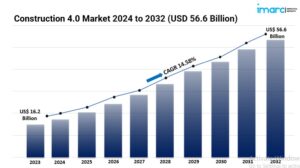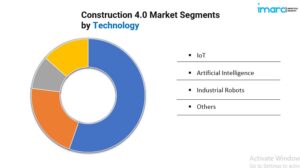
Summary:
- The global construction 4.0 Industry size reached US$ 16.2 Billion in 2023.
- The market is expected to reach US$ 56.6 Billion by 2032, exhibiting a growth rate (CAGR) of 14.58% during 2024-2032.
- North America exhibits a clear dominance, accounting for the largest construction 4.0 market share.
- Asset monitoring holds the biggest market share.
- Non-residential dominates the market share.
- A growing emphasis on sustainability and green building practices is a significant factor driving the construction 4.0 market.
- The construction 4.0 market is being driven by significant advancements in digital technologies such as Building Information Modeling (BIM), Internet of Things (IoT), and Artificial Intelligence (AI).
For an in-depth analysis, you can request a sample copy of the report: https://www.imarcgroup.com/construction-4-0-market/requestsample
Factors Affecting the Growth of the Global Construction 4.0 Industry:
- Increasing Need for Enhanced Safety:
The need for improved safety and risk management on construction sites is another crucial driver of the construction 4.0 market. Construction sites are inherently risky environments, and traditional methods often fall short in ensuring worker safety and managing risks effectively. Construction 4.0 technologies, such as wearable safety devices, drones, and real-time monitoring systems, provide a more proactive approach to safety management. These technologies enable the early detection of potential hazards and allow for immediate corrective actions, significantly reducing the risk of accidents and injuries. The integration of AI and machine learning also allows for predictive analytics that can foresee risks and suggest preventive measures. By enhancing the ability to manage risks and ensure safety, construction 4.0 technologies are becoming essential tools in the construction industry, driving their adoption and market growth.
- Focus on Sustainability:
A growing emphasis on sustainability and green building practices is a significant factor driving the construction 4.0 market. As governments and organizations worldwide implement stricter environmental regulations, the demand for sustainable construction solutions is on the rise. Construction 4.0 technologies, such as energy-efficient designs and smart building materials, help reduce the carbon footprint of construction activities. The use of advanced materials that are more durable and have lower environmental impact, combined with data-driven approaches to optimize energy consumption and reduce waste, is becoming increasingly important. Moreover, digital technologies enable better planning and management of resources, further enhancing sustainability. The focus on reducing energy usage, minimizing waste, and improving overall building performance aligns with global sustainability goals, thereby driving the adoption of construction 4.0 technologies that support environmentally friendly practices.
- Technological Advancements:
The construction 4.0 market is being driven by significant advancements in digital technologies such as Building Information Modeling (BIM), Internet of Things (IoT), and Artificial Intelligence (AI). These technologies enable enhanced project planning, real-time monitoring, and predictive analytics, allowing construction firms to optimize resource allocation, reduce waste, and improve overall project efficiency. BIM, in particular, facilitates better collaboration among stakeholders by providing a detailed digital representation of the physical and functional aspects of a project. IoT sensors and AI algorithms enable predictive maintenance and safety monitoring, minimizing downtime and preventing accidents. The integration of these technologies is revolutionizing traditional construction processes, leading to increased demand for construction 4.0 solutions.
Construction 4.0 Market Report Segmentation:
By Solution:
- Hardware
- Software
- Services
Hardware holds the largest market share as it is crucial in gathering real-time data, facilitating automation, and enhancing communication.
By Technology:
- IoT
- Artificial Intelligence
- Industrial Robots
- Others
IoT accounts for the largest market share as it plays a vital role by enabling real-time monitoring.

By Application:
- Asset Monitoring
- Predictive Maintenance
- Fleet Management
- Wearables
- Others
Asset monitoring dominates the market as it involves the continuous surveillance and analysis of physical assets.
By End User:
- Residential
- Non-residential
Non-residential holds the largest market share as they require diverse construction solutions that align with their specific operational needs.
Regional Insights:
- North America (United States, Canada)
- Asia Pacific (China, Japan, India, South Korea, Australia, Indonesia, Others)
- Europe (Germany, France, United Kingdom, Italy, Spain, Russia, Others)
- Latin America (Brazil, Mexico, Others)
- Middle East and Africa
North America’s dominance in the construction 4.0 market is attributed to the presence of advanced infrastructure.
Top Construction 4.0 Market Companies:
The competitive landscape of the market has been studied in the report with the detailed profiles of the key players operating in the market.
- ABB Ltd.
- Autodesk Inc
- Brickeye
- CalAmp Corp.
- Hexagon AB
- Hilti Corporation
- Mitsubishi Electric Corporation
- Oracle Corporation
- Topcon Corporation
- Trimble Inc.
Ask Analyst for Customization: https://www.imarcgroup.com/request?type=report&id=5684&flag=C
If you require any specific information that is not covered currently within the scope of the report, we will provide the same as a part of the customization.
About Us:
IMARC Group is a global management consulting firm that helps the world’s most ambitious changemakers to create a lasting impact. The company provides a comprehensive suite of market entry and expansion services. IMARC offerings include a thorough market assessment, feasibility studies, company incorporation assistance, factory setup support, regulatory approvals and licensing navigation, branding, marketing and sales strategies, competitive landscape, and benchmarking analyses, pricing and cost research, and procurement research.
